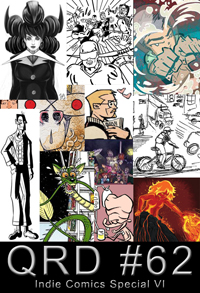
 |
| about
this issue Indie Comic Creator Interviews: Jay Payne Steven Myers William Dean Blankenship, Jr Ted Intorcio Lucas Herr Troy-Jeffrey Allen Jeff Gibbons Brian Hagen Nils Balls Eric Grissom Eric Ratcliffe Steve Peters |
 |
 |
 |
 |
 |
 |
 |
|
|
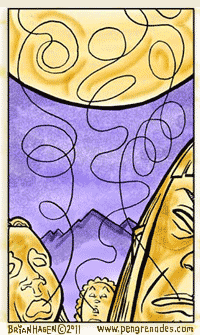 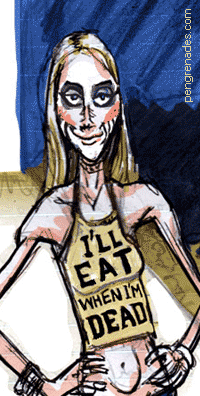 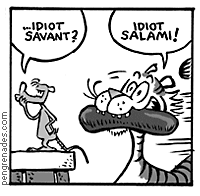 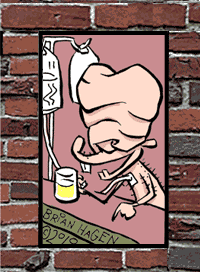 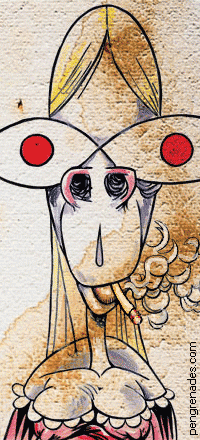 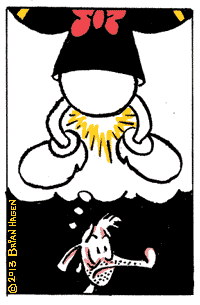 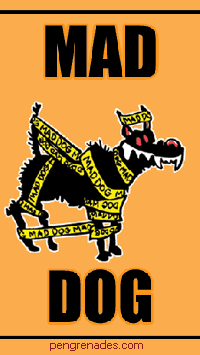 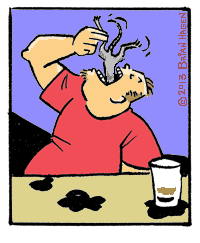 |
May 2013
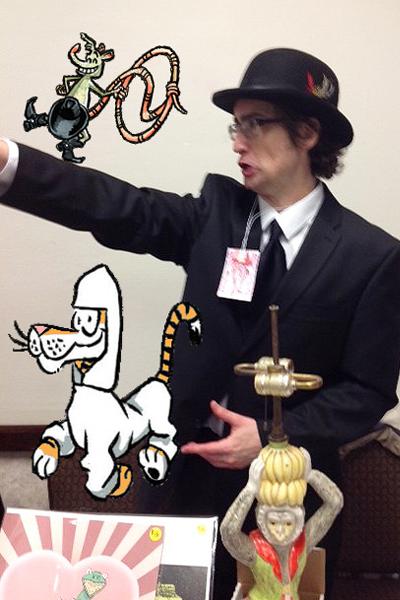
City: Cincinnati, OH
Comics: Pen Grenades, (Un)necessary Accessory, Vermin, Wrong, Naked Truth, Trent Reznor Wants My Ass, Twelve-Way with Cheese (contributor), The Kindlin’ Quarterly #8 (contributor), The Kindlin’ Quarterly #4 (contributor), FEAST (contributor)
Websites: www.pengrenades.com
QRD – How old were you when you first got into comics & did you always stick with them or did you come back to them?
Brian – I learned to read from my mother’s Peanuts collections at age 4 or 5. I stopped reading comics & I stopped drawing them after high school... & didn’t pick them up again for 10 years.
QRD – What was the first comic book you ever bought?
Brian – A reprint of Uncle Scrooge: The Fabulous Philosopher’s Stone by Carl Barks. I still have it, minus the cover & the last page or two.
QRD – How old were you when you put out your first comic?
Brian – Old! 32 & I didn’t even put it out myself. I mailed a few submissions to a small press & went off for a month to my job as a deckhand on the Louisiana oil boats. When I got back, the mail had brought 10 copies of a mini-comic of my work: Trent Reznor Wants My Ass. It sold OK, as we did a fancier second printing, but I imagine there are still Nine Inch Nails fans who want my head, as the comic had nothing to do with the band. In my defense, the name came from my comics, but using it as a title wasn’t my idea.
QRD – What decade do you think produced the best comics?
Brian – The ‘90s. The alternative comic scene had a diversity of voices like nothing ever seen before in comics. Hate! Love & Rockets! Dirty Plotte! Fleener! Ariel Bourdeaux! There were so many talented female creators making their debuts.
QRD – Why comics instead of just writing or drawing?
Brian – For the money. But seriously, folks... comics don’t have twice the punch of words or pictures by themselves. Comics are exponentially more powerful. & why only play guitar if you can also sing?
QRD – Do you see mini-comics & indie comics as paths to mainstream comics or as their own unique media?
Brian – They can be a training ground, sure, but they are completely unique. Where else can you do anything, no matter how personal, strange, or ill advised?
QRD – How many copies of your comic do you print in your first run?
Brian – In this age of print-on-demand, 50 or 100 at a time. When those sell out, I make more.
QRD – How much do you think comics should cost?
Brian – Depends on... everything: time spent making the work, the quality of the materials. I gladly pay $5 for a quality independent floppy comic. I’ll drop $15 on a great graphic novel or collection. The only absolute rule for me is to cover my costs & then pay myself something on top of that. It’s a question of self-respect to make some profit on my work.
QRD – How many books do you produce a year & how many would you like to?
Brian – My next book should be ready in the fall, using the material from the Pen Grenades webcomic. It’s been a couple of years since I last published, because I wanted to build up an online readership & a marketing strategy.
QRD – Do you think stories should be serialized or delivered as complete works?
Brian – Serialize it if you can afford it, but I wonder how many people even cover costs bringing out serialized comics any more. Still, I’ll put up with the risk of never reading a complete story if I love the work. Paul Pope used to hook me with incredible comics that he never finished. I always forgave him.
QRD – How are comic strips different than comic books & which medium do you prefer?
Brian – For my own creations, I prefer the comic strip. It gives me the freedom to do one-shot panels & the humorous continuity strip. It forces me to create strips with plotting “beats” or jokes. & by putting myself on weekly deadlines, I always deliver new comics to my online audience. But comic books give one far superior tools: the time & space to create mood, rhythm & rich compositions. In the perfect world, I’d be doing comic books.
QRD – How long is it from when you start a comic until it’s printed?
Brian – As my comics usually grow from my completed work, the delays only come from the time needed to design the book & have it printed.
QRD – What do you do better with your comics now than when you first started?
Brian – I understand WHY a joke, character, gesture, or story point works. Relying on intuition alone is unnecessarily exhausting & stressful. All great comedians, cartoonists, & artists of all stripes study their inspirations & it really pays off.
QRD – Do you do thumbnails?
Brian – Almost always. Occasionally, something emerges fully formed into my sketchbook, but not often enough to count on.
QRD – At what size do you draw?
Brian – The beauty of a computer & scanner is that I can draw teeny-tiny on Monday & draw at 125% scale on Tuesday. Usually I draw at about 125% larger so that I can reduce the size of my errors for reproduction.
QRD – What kind of pens do you use?
Brian – For a dip pen, Judges 312 nibs, a gift from cartoonist Justin Green. But honestly, give me a brush. I learned to ink with this horrible, floppy-soft brush-pen, so I can get a good line with almost any brush. It annoys me that I can’t letter with a brush.
QRD – What does your workstation look like?
Brian – Suspiciously like my kitchen table, covered in books, paper, pens, & cereal bowls & coffee cups.
QRD – At what point in the artistic process do you work digitally?
Brian – Usually, I don’t use the computer until the inks are dry on the page. When I scan that perfect scribble from on a scrap of notebook paper to fix it in Photoshop, it’s usually an idiotic use of time; taking just as much work as redrawing the damned thing.
QRD – What do you think of digital comics & webcomics?
Brian – It’s the revolution. Full color at no cost. Any size, any proportion. Unlimited distribution. Marketing made easy. When the Xeric grants were killed off, I knew: get digital or die.
QRD – Do you prefer working in color or black & white?
Brian – Although I start with a pencil, I prefer ending up in color. I avoided color for years, but computers let me experiment without destroying my original art. Color is the most amazing extension of comics language I could have imagined.
QRD – How many different people should work on a comic & what should their jobs be?
Brian – My favorite comics have been done by one person, but having an editor / collaborator can quickly find the holes in my story - or those two left hands I drew on “Stroke Delicious.”
QRD – How do you find collaborators?
Brian – Collaborators are right where I should have expected them to be: my creative friends. I know a stand-up comedian/director, a filmmaker/illustrator, & an artist/musician. They get my sense of humor & can suggest different jokes & different directions for weak strips.
QRD – How tight do you think a script should be as far as telling the artist what to draw?
Brian – If you have a collaborator you can trust, I believe in a long conversation in which words & ideas & drawings are passed back & forth. Let the writer (or writer side of your brain) go off & write as tight a script as possible. Let the artist take that & alter it as much as necessary to get the spirit on the page. In writing my own material, my artist side must sometimes literally write the words on paper & cut them into fragments with scissors, finding the pacing with my eyes & fingers.
QRD – What comic book person would you be most flattered to be compared to?
Brian – R. Crumb. From books & magazines, B. Kliban. Single-letter first names seem to have grant talent; perhaps I need to shorten my first name.
QRD – What do your friends & family think of your comics?
Brian – My mother truly loves my comics, even the twisted ones. She loved the first Shermin the Vermin so much that for a year, she paid me a $50/month salary to keep drawing the rat. My stepfather bought a large painting based on a comic. I don’t think my father reads my work & my wife seems to like about 1 in 5 of my cartoons.
QRD – What do you think of superheroes?
Brian – I will always thank superheroes for hooking me to comic books forever. That said, the last superhero comic I bought was Frank Miller’s The Dark Knight Returns. As an adult, it’s hard to accept the genre limitations of no sex, no smoking, no drinking, no drugs... mixed with murder. I think the superhero comics relaunched for kids enjoyment was a very smart idea. Did it work?
QRD – Marvel or DC?
Brian – Marvel. For giving us the 1960s Kirby & Ditko & for the 1970s Starlin, Howard the Duck, Paul Gulacy, & Steve Englehart.
QRD – What comic characters other than your own would you like to work with?
Brian – Give me Popeye!
QRD – Ideally would you self-publish?
Brian – No. The idea of additional muscle behind my distribution & marketing sounds very good to me. But I’d ask to be put in touch with Bone creator Jeff Smith’s lawyer before signing anything. Nobody deserves the rights to my characters or my work. Unless they’ve got enough money to pay off my student loans.
QRD – What conventions do you try to attend & why?
Brian – I’m just beginning to hit conventions & I can’t drive, so I’ve only been attending SPACE in Columbus, OH, & the Cincinnati comic convention. This will change, as I’ve discovered I love conventions & public speaking.
QRD – What do you do to promote your books?
Brian – Along with the SPACE & Cincinnati conventions, I have been interviewed several times, I contribute to anthologies, & I use social media: Tumblr, Twitter, Facebook & Google+.
QRD – Do you think your comics are well suited to comic shops or would sell better elsewhere?
Brian – The comic shops in my area cater to superhero fans, so I would be very surprised if they pushed my work. Pen Grenades isn’t polite or well behaved & my fans are individualists. I believe the future for Pen Grenades will continue to be at alternative galleries, non-chain record shops, & coffee shops. The future will include independent bookstores & local author events & independent businesses.
QRD – What other medium would you like to see some of your comics made into (television, film, games, action figures, etc.)?
Brian – Animated cartoons would be exciting & challenging, although I’m a little afraid of revealing the ethnicities of some of my characters. Maybe I won’t share that little bit of information.
QRD – Do you consider yourself a comic collector or a comic reader or both?
Brian – Both. I’m a comic hoarder who reads what he hoards.
QRD – What do you see as the most viable mediums for comics distribution 10 years from now?
Brian – Books & the internet. Unless we reintroduce the kids’ comic book to drugstores, supermarkets, or other locations that break the class barriers, the comic book will die. As soon as the Marvel & DC superhero movie franchises disappear, watch what happens to comic books & comic book stores. It’ll be frightening.
QRD – What would you like to see more people doing with comics?
Brian – Sharing them. I would give 90% of my collection away if I could hope that 10 other people would read each comic.
QRD – Anything else?
Brian – Comics are a medium that make each creator very, very powerful. We don’t need no stinkin’ budget. Put a comic on a wall & both children & adults will stop in their tracks to read that comic. Non-cartoonists have no idea how compelling the right combination of words & pictures are.
Also, I think the biggest weakness of alternative comics is the difficulty of finding our audiences. Only through my gallery show did I discover that a large number of Pen Grenades fans are women from the ages of 50 - 65. I was surprised & it led me to think: “Who the heck is my audience & how do I find it?” Those readers are out there, somewhere.
